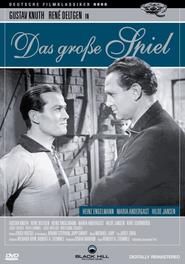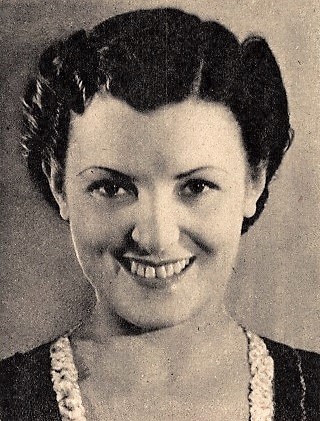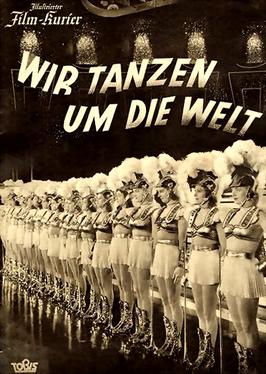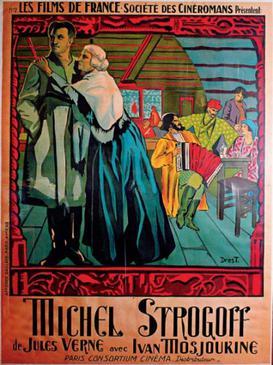
Michael Strogoff: The Courier of the Czar is a novel written by Jules Verne in 1876. Critic Leonard S. Davidow, considers it one of Verne's best books. Davidow wrote, "Jules Verne has written no better book than this, in fact it is deservedly ranked as one of the most thrilling tales ever written." Unlike some of Verne's other novels, it is not science fiction, but its plot device is a scientific phenomenon. The book was later adapted to a play, by Verne himself and Adolphe d'Ennery. Incidental music to the play was written by Alexandre Artus in 1880 and by Franz von Suppé in 1893. The book has been adapted several times for films, television and cartoon series.

Lucie Höflich was a German actress, teacher and head of the Staatliche Schauspielschule in Berlin. In 1937 she was named the Staats-Schauspielerin and in 1953 she was awarded the Bundesverdienstkreuz.

The Big Game is a 1942 German sports film directed by Robert A. Stemmle and starring René Deltgen, Gustav Knuth and Heinz Engelmann. It featured famous German footballers of the era. National coach Sepp Herberger arranged for many German international footballers to be recalled from fighting in the Second World War, ostensibly to improve the quality of the film, but actually to try to protect them from the horrors of war.

On Trial is a 1954 Franco-Italian crime drama film directed by Julien Duvivier and starring Daniel Gélin, Madeleine Robinson and Anton Walbrook. It was based on a 1928 novel by Jakob Wassermann.

Strogoff is a European adventure film directed in 1970 by Eriprando Visconti. It was an international co-production between Italy, West Germany and France. It is based on Jules Verne's 1876 novel Michael Strogoff reinterpreted through the lens of psychological realism.

Maria Andergast was a German actress. She appeared in more than 60 films between 1934 and 1974.

The Soldier and the Lady is the 1937 American adventure film version of the oft-produced 1876 Jules Verne novel, Michel Strogoff. Produced by Pandro S. Berman, he hired as his associate producer, Joseph Ermolieff. Ermolieff had produced two earlier versions of the film, Michel Strogoff in France, and The Czar's Courier in Germany, both released in 1936. Both the earlier films had starred the German actor Adolf Wohlbrück. Berman also imported Wohlbrück, changing his name to Anton Walbrook to have him star in the American version. Other stars of the film were Elizabeth Allan, Margot Grahame, Akim Tamiroff, Fay Bainter and Eric Blore. RKO Radio Pictures had purchased the rights to the French version of the movie, and used footage from that film in the American production. The film was released on April 9, 1937.

We Danced Around the World is a 1939 German musical film directed by Karl Anton and starring Charlotte Thiele, Irene von Meyendorff, and Carola Höhn. It is a backstage musical. The film's sets were designed by Paul Markwitz and Fritz Maurischat.
The House of Lies is a 1926 German silent drama film directed by Lupu Pick and starring Werner Krauss, Mary Johnson and Lucie Höflich. It is an adaptation of Ibsen's 1884 play The Wild Duck. The film's art direction was by Albin Grau. Pick also produced the film and was one of its co-writers.

Michel Strogoff is a 1926 French silent historical adventure film directed by Viktor Tourjansky and starring Ivan Mozzhukhin, Nathalie Kovanko, and Acho Chakatouny. It is an adaptation of Jules Verne's 1876 novel Michael Strogoff. In 1961 Tourjanski directed a sequel titled Le Triomphe de Michel Strogoff.

The Beaver Coat is a 1928 German silent comedy film directed by Erich Schönfelder and starring Ralph Arthur Roberts, Lucie Höflich and Wolfgang von Schwindt. It is based on Gerhart Hauptmann's play The Beaver Coat. It was made by the German subsidiary of First National Pictures. It was shot at the Staaken Studios in Berlin. The film's art direction was by Bruno Lutz and Franz Seemann.
Michel Strogoff is a 1975 French / Italian / German miniseries directed by Jean-Pierre Decourt. It is based on the novel of the same name by Jules Verne.

Michael Strogoff is a 1944 Mexican historical drama film directed by Miguel M. Delgado and starring Julián Soler, Lupita Tovar and Julio Villarreal. It is based on the 1876 Jules Verne novel Michael Strogoff. Numerous adaptations have been made of the story. The film's sets were designed by the art director Manuel Fontanals.

The Gypsy Baron is a 1935 German operetta film directed by Karl Hartl and starring Anton Walbrook, Hansi Knoteck and Fritz Kampers. It is an adaptation of the 1885 operetta The Gypsy Baron. It was made at the Babelsberg Studios of UFA in Berlin. The film's sets were designed by the art director Werner Schlichting. It was shot on location in Brandenburg and the Kingdom of Yugoslavia. A separate French-language version, Le baron tzigane, was also produced.
Goetz von Berlichingen of the Iron Hand is a 1925 German silent historical adventure film directed by Hubert Moest and starring Eugen Klöpfer, Friedrich Kühne and Paul Hartmann. It is an adaptation of the 1773 play Götz von Berlichingen by Johann Wolfgang von Goethe.

Michel Strogoff is a 1936 French historical adventure film directed by Jacques de Baroncelli and Richard Eichberg and starring Anton Walbrook, Colette Darfeuil and Armand Bernard. It is an adaptation of the 1876 novel Michael Strogoff by Jules Verne. A separate German version The Czar's Courier was also made.
Mary Magdalene is a 1920 German silent drama film directed by Reinhold Schünzel and starring Eduard von Winterstein, Ilka Grüning and Lucie Höflich.

A Woman Who Knows What She Wants is a 1934 Czechoslovak musical comedy film directed by Victor Janson and starring Lil Dagover, Anton Edthofer, and Anton Walbrook, a German-language version of Czech film A Woman Who Knows What She Wants. It is an adaptation of a 1932 stage musical of the same title, with music by Oscar Straus. It was filmed at the Barrandov Studios in Prague.
My Life for Maria Isabella is a 1935 German drama film directed by Erich Waschneck and starring Viktor de Kowa, Maria Andergast and Peter Voß. It is a military drama, the Maria Isabella of the title being the name of a regiment. Heavy cuts were imposed by the censors because of fears the film's mutiny scenes were too attractively portrayed. Critics were not impressed by the casting of Viktor de Kowa, known for his light musical comedy roles, as the film's hero.

The Citadel of Warsaw is a 1937 German drama film directed by Fritz Peter Buch and starring Lucie Höflich, Werner Hinz and Viktoria von Ballasko. The film's sets were designed by the art directors Karl Haacker and Hermann Warm. It is based on the play Tamten by Gabriela Zapolska, previously made into the 1930 film The Citadel of Warsaw.















